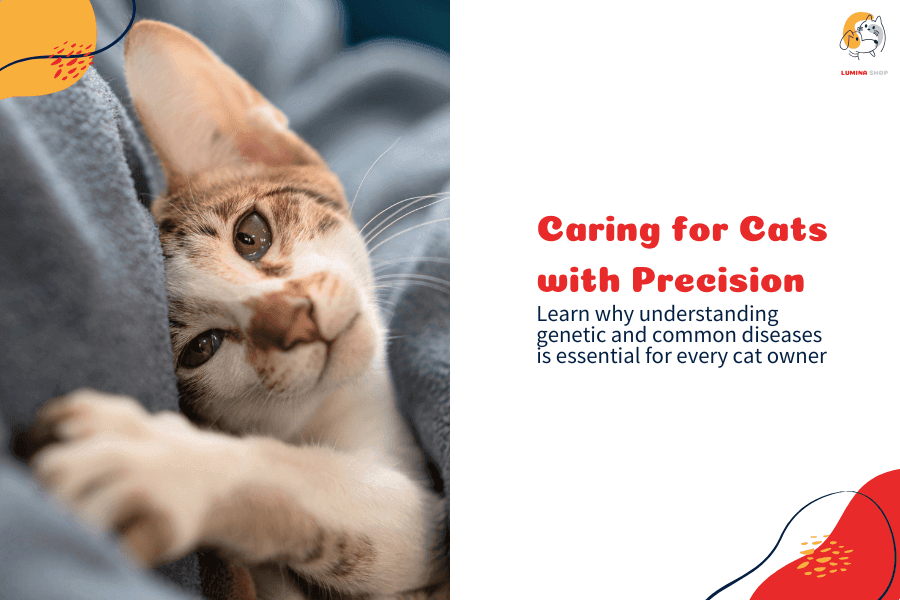
Genetic and Common Diseases in Cats
Understanding Breed-Specific Health Issues and Solutions:
Cats, whether they are playful kitten cats or wise senior female cats and male cats, bring joy to our lives. However, they are prone to various health issues, including genetic ailments and common diseases. Understanding these conditions, their causes, and potential solutions can help you provide the best care for your furry companion. In this blog, we’ll explore genetically inherited diseases, common feline illnesses, and how genetic testing and proper care can make a difference.

Genetic Diseases in Cats
Genetic illnesses are inherited conditions passed down from one generation to the next. These conditions are often linked to specific cat breeds, such as Persian cats, Siamese cats, and British fold cats. Here are some key genetic sicknesses and the breeds most commonly affected:
1. Hypertrophic Cardiomyopathy (HCM)
Breeds Affected: Maine Coon, Ragdoll, British Shorthair
Description: HCM is a heart condition where the heart muscle thickens, making it harder for the heart to pump blood.
Solutions: Regular veterinary for cats check-ups, genotype testing, and medications to manage symptoms.
Recommended Product: Interactive Cat & Dog Play Ball – Keep your cat active and engaged to support heart health.
External Resource: Learn more about HCM from the Cornell Feline Health Center.
2. Polycystic Kidney Disease (PKD)
Breeds Affected: Persian cat breeds, Himalayan, Exotic Shorthair
Description: PKD causes cysts to form in the kidneys, leading to kidney problems in cats and eventual kidney failure.
Solutions: Genetic examination before breeding, special diets, and regular monitoring of kidney function.
Recommended Product: Pet Sensory Water Play Mat – A fun way to encourage hydration, which is crucial for kidney health.
External Resource: Read more about PKD from the International Cat Care.
3. Feline Leukemia Virus (FeLV)
Breeds Affected: All types of domestic cats, but outdoor cats are at higher risk.
Description: FeLV is a viral infection that weakens the immune system and can lead to cancer or other severe illnesses.
Solutions: Vaccination, keeping cats indoors, and regular veterinarian for cats screenings.
Recommended Product: Smart Cat Toy Car – Keep your indoor cat entertained and active.
External Resource: Find out more about FeLV from the American Veterinary Medical Association (AVMA).
4. Spinal Muscular Atrophy (SMA)
Breeds Affected: Maine Coon
Description: SMA is a chromosome defect that affects the muscles, leading to weakness and mobility issues.
Solutions: Genetic testing test and supportive care to improve quality of life.
Recommended Product: Interactive Lobster Dog Toy – A soft, engaging toy for cats with limited mobility.
External Resource: Learn more about SMA from Basepaws.
5. Progressive Retinal Atrophy (PRA)
Breeds Affected: Abyssinian, Somali
Description: PRA causes gradual vision loss and can lead to blindness.
Solutions: Genetic treatment and environmental adaptations for visually impaired cats.
Recommended Product: Bounce & Squeak IQ Ball – A toy that makes noise to help visually impaired cats play.
External Resource: Read more about PRA from the Cornell Feline Health Center.

Common Diseases in Cats
While genetic diseases are often breed-specific, some health issues are common across all cats, regardless of breed or age in cats. These conditions can affect any cat, from kitten and cats to senior felines:
1. Feline Lower Urinary Tract Disease (FLUTD)
Symptoms: Difficulty urinating, blood in urine, frequent urination.
Causes: Stress, diet, or urinary tract infections in cats.
Solutions: Increased water intake, special diets, and stress reduction.
Recommended Product: Pet Automatic Rolling Ball – A stress-relieving toy to keep your cat active and happy.
External Resource: Learn more about FLUTD from the ASPCA.
2. Hyperthyroidism in Cats
Symptoms: Weight loss, increased appetite, hyperactivity.
Causes: Overactive thyroid gland, often seen in older cats.
Solutions: Medication, radioactive iodine therapy, or surgery.
Recommended Product: Interactive Cat & Dog Play Ball – Helps manage weight and energy levels.
External Resource: Read more about hyperthyroidism from VCA Hospitals.
3. Chronic Kidney Disease (CKD)
Symptoms: Increased thirst, weight loss, lethargy.
Causes: Aging, genetics, or underlying health conditions.
Solutions: Special diets, hydration therapy, and regular cat to vet check-ups.
Recommended Product: Pet Sensory Water Play Mat – Encourages hydration, which is vital for kidney health.
External Resource: Learn more about CKD from the International Cat Care.
4. Diabetes Mellitus
Symptoms: Increased thirst, frequent urination, weight loss.
Causes: Obesity, poor diet, or genetic predisposition.
Solutions: Insulin therapy, weight management, and dietary changes.
Recommended Product: Smart Cat Toy Car – Keeps your cat active and helps with weight management.
External Resource: Read more about feline diabetes from PetMD.
5. Ringworm
Symptoms: Circular patches of hair loss, itching, and redness.
Causes: Fungal infection.
Solutions: Ringworm treatment for cats includes antifungal medications and environmental cleaning.
Recommended Product: Interactive Lobster Dog Toy – A soft, easy-to-clean toy for cats recovering from ringworm.
External Resource: Learn more about ringworm from the CDC.

The Role of Genetic Testing in Cat Health
Genetic testing has become an invaluable tool for identifying breed-specific health risks and preventing the spread of genetic illnesses. Here’s how it can help:
1-Early Detection: Cat DNA tests can identify carriers of specific diseases, allowing breeders to make informed decisions and avoid passing on harmful genes.
2-Personalized Care: Knowing your cat’s gene expression and genetic predispositions can help you tailor their diet, exercise, and medical care to their specific needs.
3-Breeding Programs: Responsible breeders use genetic examination to reduce the incidence of hereditary diseases in their lines.
Recommended Product: Interactive Cat & Dog Play Ball – A great way to keep your cat active while you monitor their health.
External Resource: Learn more about genetic testing from Basepaws.

Preventive Care and Solutions
While genetic sicknesses cannot always be prevented, there are steps you can take to minimize risks and manage symptoms:
1-Regular Vet Visits: Routine check-ups with a veterinarian for cats can help detect health issues early.
2-Balanced Diet: Provide high-quality food for cats tailored to your cat’s age, breed, and health needs.
3-Exercise and Enrichment: Keep your cat active and mentally stimulated to prevent obesity and stress-related illnesses.
4-Vaccinations: Ensure your cat is up-to-date on vaccinations to protect against common diseases like FeLV.
5-Genetic Testing: If you have a purebred cat, consider genotype testing to identify potential health risks.
Recommended Product: Bounce & Squeak IQ Ball – A fun way to keep your cat entertained and active.

Conclusion
Understanding genetic and common diseases in cats is essential for providing the best care for your feline companion. By being aware of breed-specific health issues, utilizing genetic testing, and implementing preventive care measures, you can help your cat live a longer, healthier, and happier life.
If you suspect your cat may be at risk for a genetic ailment or common disease, consult your veterinary for cats for guidance. With the right knowledge and care, you can ensure your kitten cat or adult feline thrives for years to come.
Explore More: Visit Lumina Pet Shop to discover a wide range of interactive toys, health products, and accessories designed to keep your cat happy and healthy. Your furry friend deserves the best! 🐾
